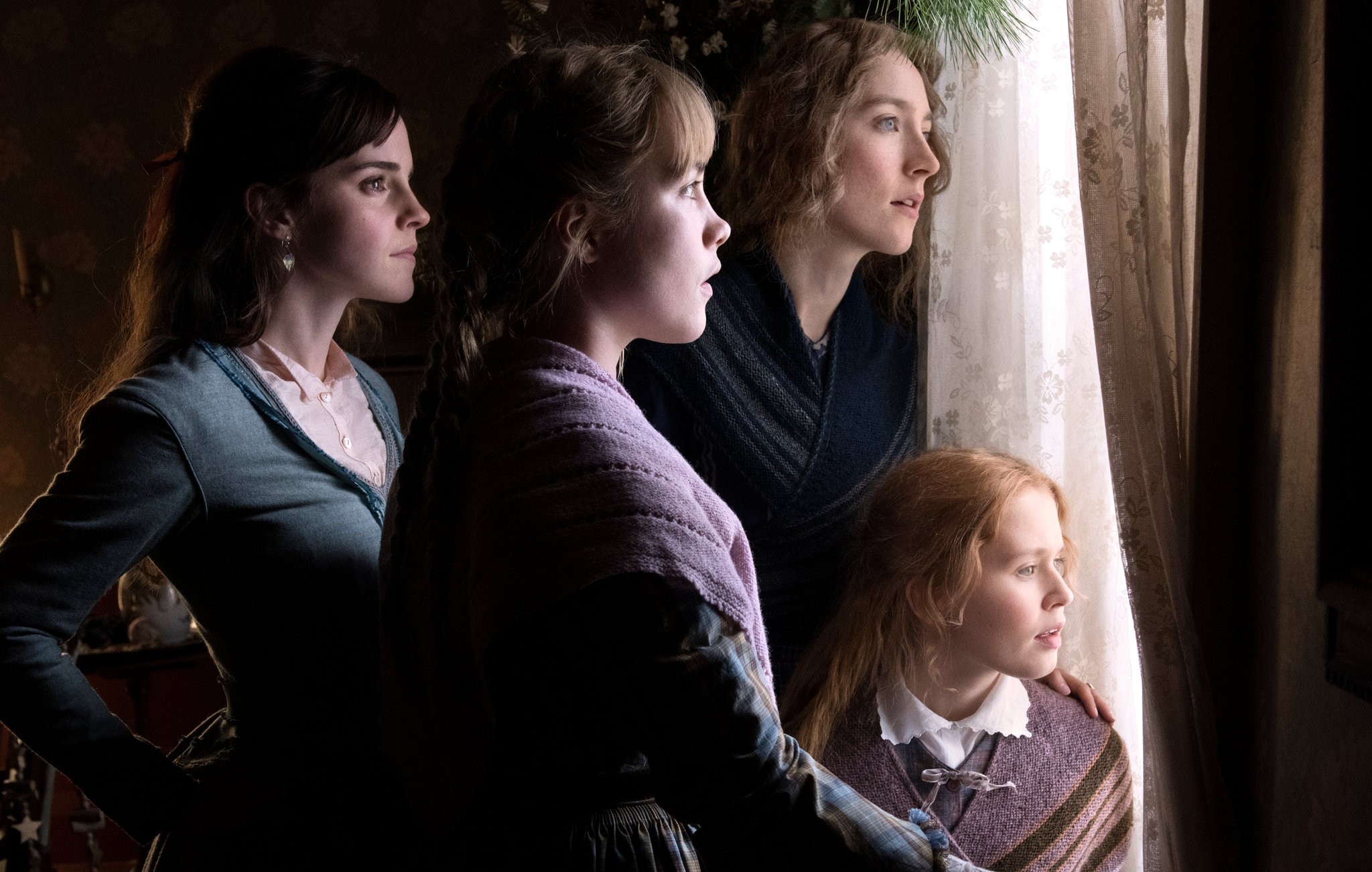
The March sisters: Meg (Emma Watson), Amy (Florence Pugh), Jo (Saoirse Ronan), and Beth (Eliza Scanlen)
For Never Seen It, I convince someone interesting to catch up on a classic (or maybe not so classic) film they’ve missed, then we talk about it. This time around, I got the boss, Anna Traverse Fogle, CEO of the Flyer‘s parent company Contemporary Media, to watch director Greta Gerwig’s 2019 adaptation of Louisa May Alcott’s Little Women, which was 19 on my list of the 25 Best Films of the 2010s. Our quite lengthy conversation has been edited for brevity and clarity.
Chris McCoy: What do you know about Little Women?
Anna Traverse Fogle: Book or movie?
Chris: More like, what is your relationship with Little Women?
Anna: I remember reading the book when I was a fairly young person myself. I was one of those kids who the librarians would laugh at because I would walk up to the librarian’s desk with a foot-tall stack of books. And they’re like, “You’re not going to read all of those, little girl.” And I was like, “You watch me.” I was pretty young, which means both that it made something of an impression on me, and also that I don’t remember it all that well. I remember the characters to some extent. I remember liking the beginning, and I remember it kind of losing my interest at some point. When I was in the earlier portions of the book, I was more like, “These are characters I can relate to.” And then as they got older, I think maybe I couldn’t relate as much. I certainly remember thinking of them — this is a child’s perception — but sort of in the same way that I had a relationship with a character than, like, the Laura Ingles Wilder books. I was not thinking about them critically, but thinking more in terms of who am I the most like. Whose personality traits do I want to be? So I was thinking about it in that very inner kind of way.
Chris: I think for a lot of girls, for a long time, the question of which of the March sisters you’re like was kind of like which of the Hogwarts houses you belong to.
Anna: Or which of the Sex and the City girls you relate to. And somehow, once you have identified which archetype of young woman you are, then you will understand other pieces of information that you would like to have about yourself.
Chris: Okay. Let’s do this.
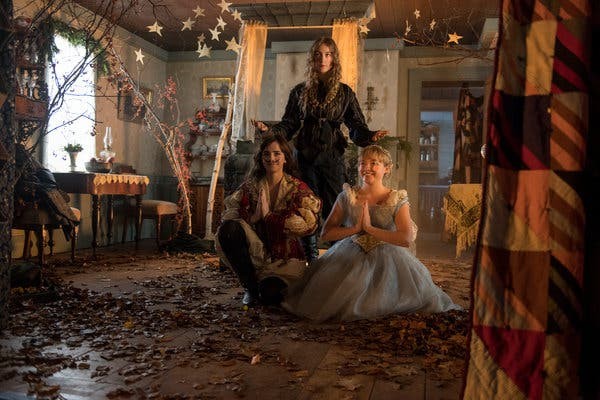
Acting!
135 minutes later…
Chris: Anna Traverse Fogle, you are now someone who has seen Little Women. What did you think?
Anna: I mean, it’s changed me as a person.
Chris: Okay! That’s great!
Anna: It brought back more of the book that I realized was still in my head. Although I don’t know enough that I could speak to the distinctions between book and film. I don’t remember that the book did any of the temporal switching, which I found … I kind of got around it over the course of things. But you know, I’m a sleep-deprived, addle-minded person today. There were a few moments in the beginning when I was like, where are we? Then I clued in. I mostly liked that, but I did find it took a little bit of getting used to for me.
Chris: I think that was the big thing [director] Greta [Gerwig] brought to it, because she was hired to write the screenplay. And when [producer Amy Pascal] read the screenplay, and then saw Lady Bird, she was like, “Yeah, you should just direct it.”
Anna: I thought it ended up working really well — and added texture. It made it something other than just, “Let’s try to do a somewhat faithful adaptation of a much-beloved book.” It made it feel more like something that made sense as a film. That’s not something I think would have worked as well in any other format. In terms of, how do we re-imagine this novel as a film, that, to me, really made it something that felt like a work of cinema, and not like, “Let’s sit around and talk about how I like the book better. Well yes, of course everybody likes the book better. This made them operate more like independent works of art.”
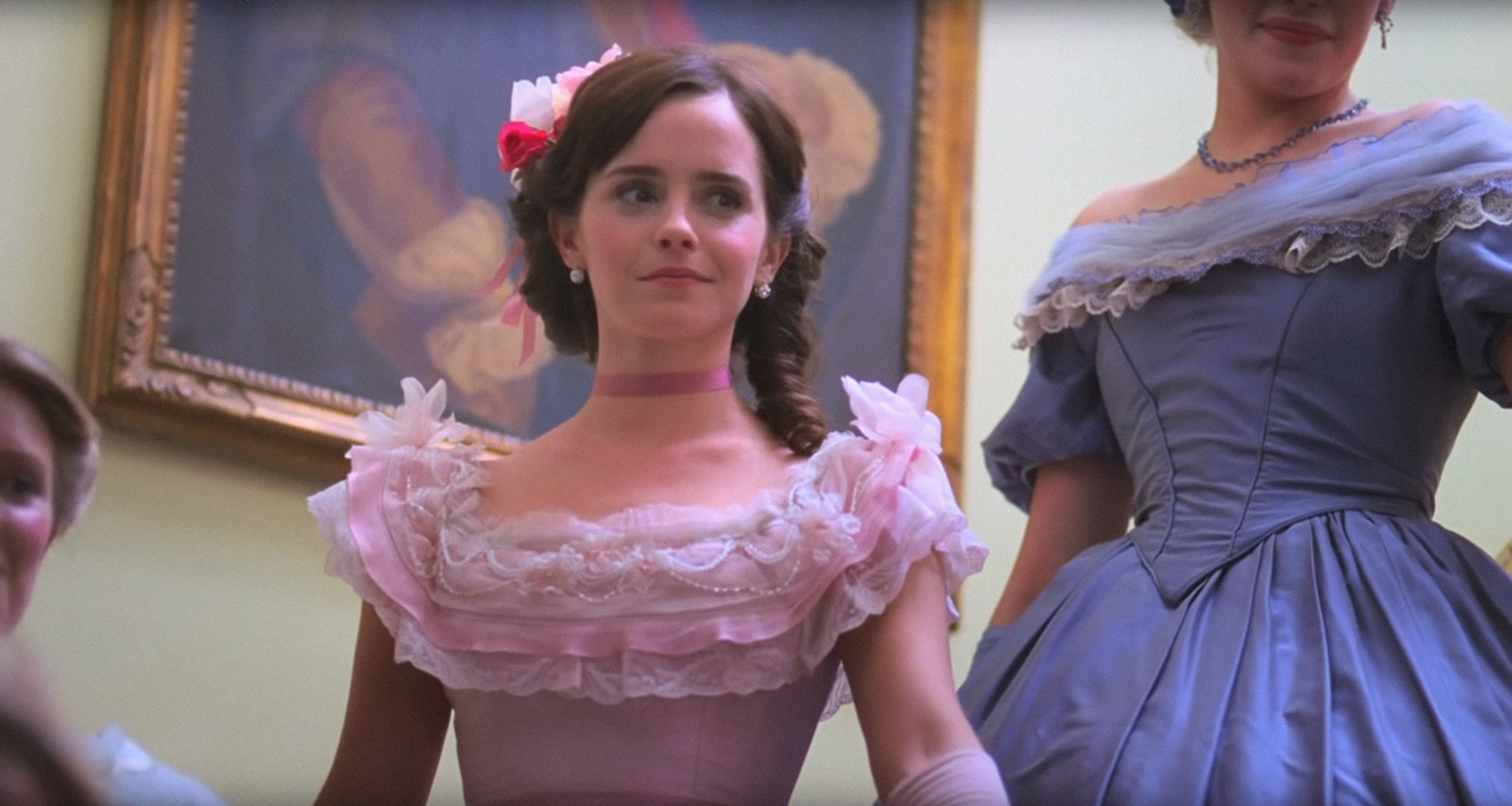
United Nations Goodwill Ambassador Emma Watson
Chris: You’re gonna have to cut a whole lot from the book no matter what you do. I think the genius of the way she structured it is that you don’t realize what’s gone until it’s over.
Anna: Right. Because you aren’t watching it unfold from beginning to end. It turns it into this kaleidoscopic experience where it’s like, now I’m here, now I’m here, now I’m here. So you’re getting all of these elements, but you aren’t like “Oh gosh, They left out that bit I remember really well from the book,” because it’s coming at you in a different sequence.
Chris: She really handled the transitions so well. I mean, you’re a writer and editor. You know what a hard job that was.
Anna: Yeah, no kidding. And again, this is going to go back to how very long it’s been since I read the book, but I feel like there are some elements of the book that everybody probably remembers that she ended up having to decide, that’s not going to make it into the film because that’s going to take us off into some other direction that isn’t going to work. But I thought in terms of the spirit of the characters, it very much captured each one of their personas.
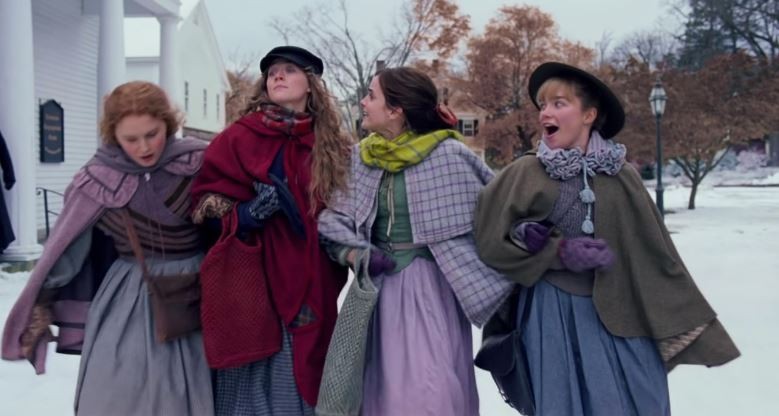
Chris: The casting just could not be better.
Anna: If you had some mental image of these characters in your head from when you read Little Women when you were 12, these people somehow are them. The casting job has to be really good if Meryl Streep is there, and you’re sort of like, “Oh yeah, this is Meryl Streep.”
Chris: She’s an important character, but not one that you actually see all that much of, relatively speaking.
Anna: She’s not stealing it. Nor does she want to. She’s someone who can be that character.
Chris: Aunt March is so great, and I love how Greta deploys her because this can be a saccharine or at least a very sweet story. But whenever it starts to get too sweet, you get a little bit of Aunt March. She literally one time says, “I’m so sick of this,” and rolls her eyes and walks off.
Anna: Right! If things are getting a little bit too sentimental, and isn’t it great, and they love each other so much and blah blah blah … Well, let me give you some witty rejoinder and caustic remark. And then we can return to what we’re here to do.
Chris: Her job is to take the piss out of the thing.
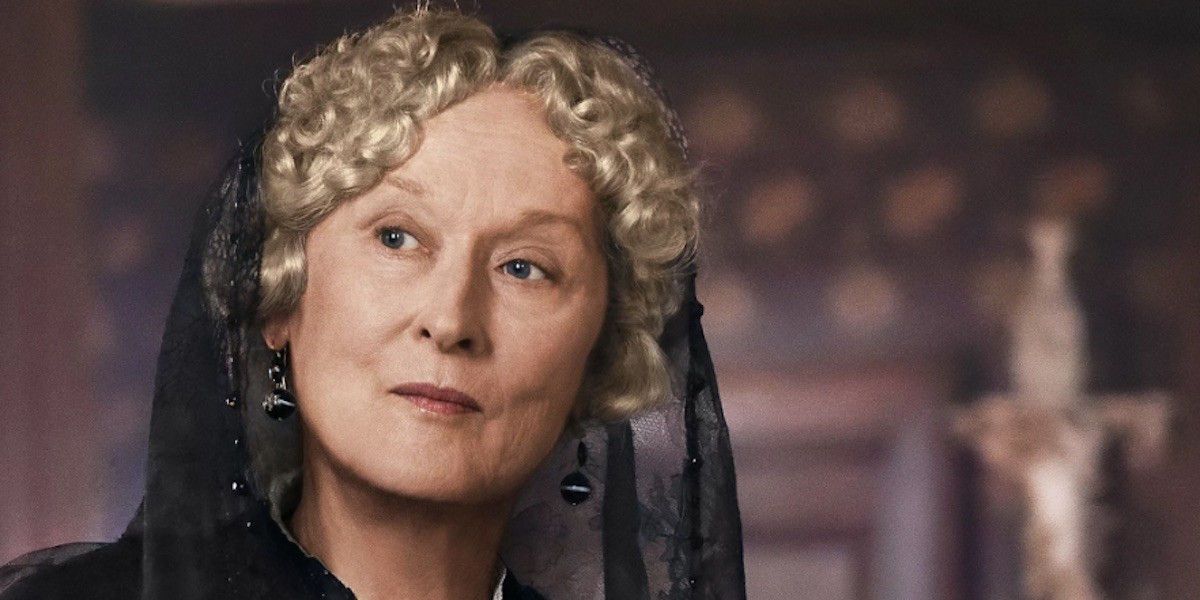
Meryl Streep takes no guff as Aunt March.
Chris: I personally am a Jo, even as a guy. Because she’s a writer.
Anna: I mean, she is such a writer, and I have to say, perfect for my little literary slash editor slash book junkie heart. Before I was working in media, I did a stint as an undergrad as a very, very low-level helper person at the University Press. All of these things combined to make these scenes of the book creation process so meaningful. When Jo’s locking herself in the attic, as someone who writes, I both understand what impels her to do that, and I can never imagine having a moment in my life when I can give into it. Who has that kind of time, to lock themselves in an attic for several days and write reams of pages? I liked the great shots of all of the pages she’s got lined up on on the floor. And then later when the book is being put through the printing press and assembled and stitched and the cover is being attached to it, I was like …
Chris: Oh yeah! The book-binding montage just killed me this time.
Anna: It made me wish that, instead of cooking shows, there would just be shows about, “Now I’m going to put together a book and show you how.”
Chris: I would so watch that.
Never Seen It: Watching Little Women with Contemporary Media CEO Anna Traverse Fogle (3)
Chris: The only casting that pulls me out of it is Bob Odenkirk as the dad. I mean, he’s great, but …
Anna: The character is a little out of place.
Chris: Nobody cares about the dad. We get to know this group of people as a self-sustaining entity, and then all of a sudden, “Oh, he’s back!”
Anna: Marmee has a husband, and they have a father, and he’s in the house. But he’s a little bit like, wandering over to the corners, like “Where do I fit here after all of this?” I guess that was actually the way it was meant to be.
Chris: Yeah, I agree with that. At one point in my note — you know, I take note, because I’m a pro-fessional — I have “0.0% male gaze” … This is a movie made by women, about women, for women.
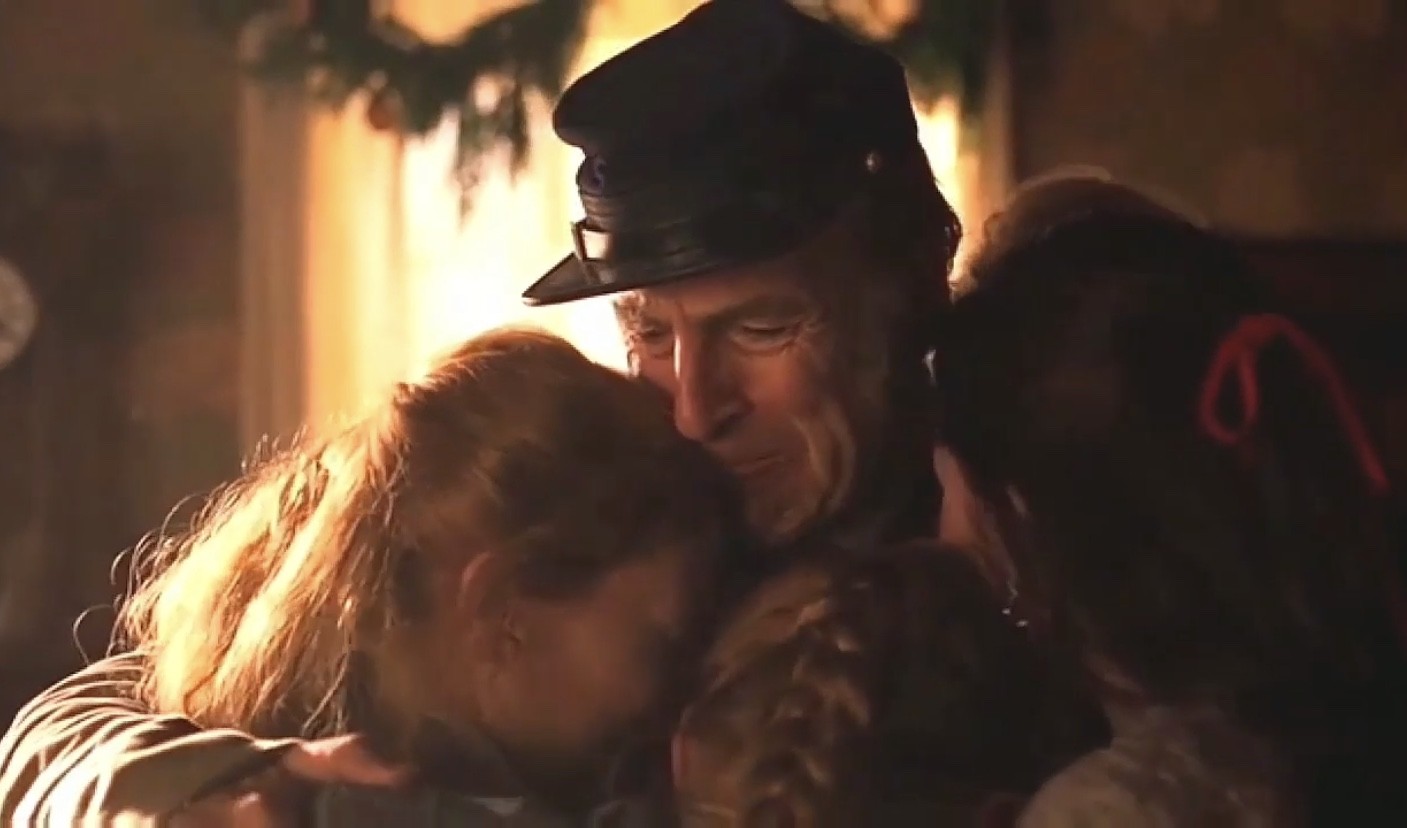
Bob Odenkirk as Father March
Anna: You’re probably right that it’s for women. I’d be curious to look at the gender breakdown of the theatrical audiences. I have a sense that if you’re in an opposite sex relationship, probably more women were dragging their male partners to see it than vice versa. Maybe that’s just my assumption.
Chris: I think when I saw it in the theater that I was the only male there. [Laughter] I loved it, though, because it’s such a perfect movie. There’s not a wasted scene.
Anna: I had a few moments where I felt like it almost felt like the actors were clearly people in 2019 speaking the dialogue of people 150 years ago. It didn’t happen very often. For the most part, it felt very natural coming out of their mouths.
Chris: Well, the naturalism of the acting comes from mumblecore. Greta Gerwig came up from the American DIY underground. She was an actress in Joe Swanberg movies. That’s the only thing to really survive from that movement, how the dialogue overlaps. That’s very modern, very Robert Altman.
Anna: I did notice the people talking over each other. It felt very natural. Of course people who happen to be living in the 19th century wouldn’t magically have always waited their turn in line to speak, especially if they’re in a room full of their families. But I think that’s often how our film versions of novels, or just films that are set in quote unquote “the olden days.” You know, I say my nicely crafted line and then give you sufficient air space to say your nicely crafted line, and we just go back and forth. Nobody talks like that. I doubt people ever have. I love the sense that the dialogue really felt like spoken dialogue.
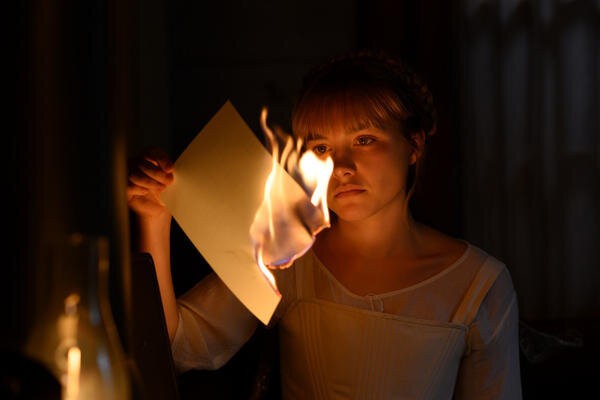
Burn, Hollywood, Burn
Chris: She has fun with it. So many of these classic works, I think when people approach them, they are kind of intimidated by them. They’re like, “I have to have a reverence for this work.” And it sucks the fun out of it. You see that in lit classes all the time. But all these women are having just a blast. It shows in a movie, to me, when the actors are actually having fun.
Anna: I have to think this was probably so refreshing for everyone involved. This goes back to what you were saying about the absence of the male gaze. I’m sure that translated every day they were on set. Like how are we going to put this thing together? I don’t know, but we’re gonna figure it out and we are not being subjected to anybody’s opinion but ours. We don’t have to feel the burden of that set of expectations, and let it play out in the way that feels natural.
Chris: And nobody’s gonna get naked. Timothée Chalamet, who is Laurie, he’s the babe in this movie — the man-bimbo.
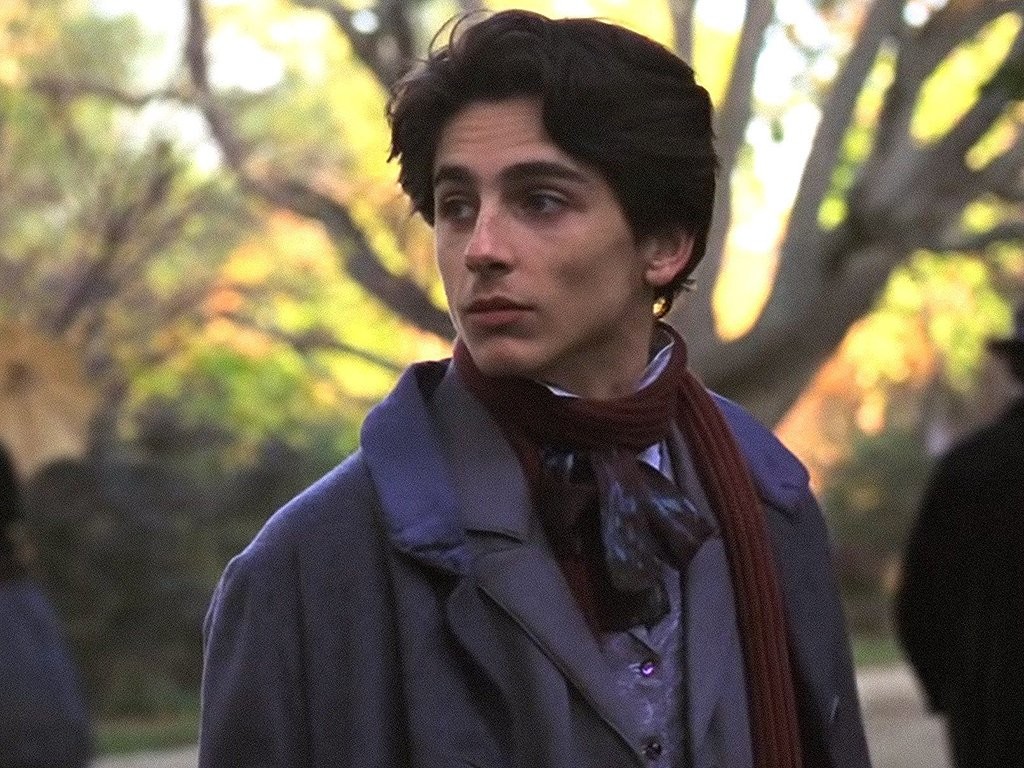
Himbo Timothée Chalamet as Theodore ‘Laurie’ Laurence.
Anna: If anything, there is a little bit of the opposite of male gaze there. It’s like, “Okay, yeah here’s this guy. He’s going to be the love interest. But let’s not actually make him too interesting or too engaging.” He always feels a little bit, frankly, not quite up to par.
Chris: He’s a drunken lout for about half the movie.
Anna: Well, there is that. But like once he’s not, he still feels a little bit like he wants to be on their level, but he’s not.
Chris: Yeah, there’s a feeling that Amy settles, even though she says she’s been in love with him the whole time.
Anna: He didn’t always quite realize that. It did feel a little bit like she was thinking, “Okay, well, I guess I need to make something happen. So here’s this guy I’ve known for a long time. I guess it’s kind of in the cards, so here we go.” Jo, of course, is like, “I think I would be perfectly happy never to marry. Well, it’s not perfectly happy, but maybe that’s my destiny. I can accept that, and I can do other things. I could have interesting pursuits, and I can craft a life for myself.” I think having that level of understanding and independence and ability makes it easier for her to forge a path.
Chris: She is sort of a proto-modern woman. She’s the one that you can relate to the most from the 21st century, because she wants to have a career.
Anna: That’s not going to be an either/or proposition for her, between having a career and having love interests she pursues. I think in any scenario, she takes the career, if it becomes an either/or thing. That’s not something that was all that acceptable. We talk about the 21st century, but if it becomes an either/or thing between finding someone marriageable or having an interesting and fulfilling career … Well, it is certainly not an assumption for everybody that women are going to necessarily pick the career.
Chris: That’s the point of Amy’s speech. The actress who plays Amy is Florence Pugh, and that speech, “Marriage is an economic proposition,” she plays it to perfection.
Never Seen It: Watching Little Women with Contemporary Media CEO Anna Traverse Fogle (2)
Anna: That felt so finely crafted and yet quite believable that that would be coming out of her mouth exactly the way it emerged. It would have been perfect if she had delivered that in any format. It’s something that, if she prepared to send in a letter, and labored over it for hours, she could not have done better.
Chris: That was such a moment of absolute, deep-down clarity. I think she sees herself better than Jo sees herself. For all of Amy’s faults, and you could say that she’s a retrograde or reactive character, but she understands herself better than anybody else in the whole story.
Anna: I mean she seems to be someone who was like, “Okay, look I’m not I’m not at the same level that you know that Jo is, but I’ve got this going for me, and I can make these decisions, and I think I can make this work.” I think that comes along over the course of things. Part of the beauty of that speech is that you’ve seen some of it developing in her, but at that moment you’re like, “Okay. Yeah. This is exactly how she’s thinking.”
Chris: And also, that line Laurie has right before the speech, “What women are allowed into the club of geniuses?” That really rings.
Anna: But in his case, it’s an accidental truth, know what I mean?
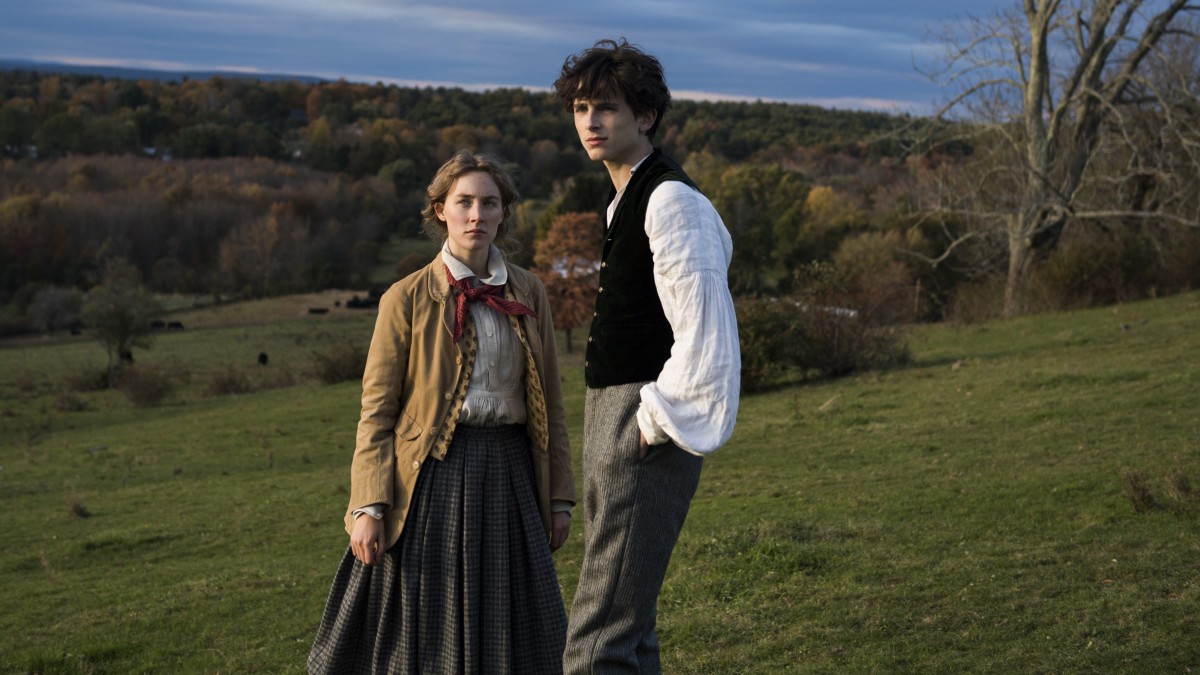
Jo and Laurie take a walk in the New England countryside.
Chris: Would you recommend this movie to other people?
Anna: Yeah, I totally would. I had fully intended to see this movie when it came out and didn’t. I will tell you I don’t go to that many movies in the theater, so for me even to have considered the possibility of going is an indication that I was quite interested. Honestly, most of the movies we were going to see in the theater are something in the Marvel universe with my stepson. But yeah, I would absolutely recommend it to really anybody. It’s easy to say that, if you happen to fall into a similar demographic as me, or if you’re interested in feminism, blah blah blah … And yes, this is a movie for you if you just like New England and autumn! It made me really miss living in Massachusetts.
Chris: How long did you live in Massachusetts?
Anna: Only three years. I was in grad school up there, but felt very at home. I lived in the Boston metro area, but it’s so easy to drive into those little towns where the fall is the most beautiful fall you’ve ever seen. There’s just something about that you can’t duplicate anywhere else. There were a few moments where I was like, “Oh gosh yes, I need to go back to New England in the fall.”
Never Seen It: Watching Little Women with Contemporary Media CEO Anna Traverse Fogle
